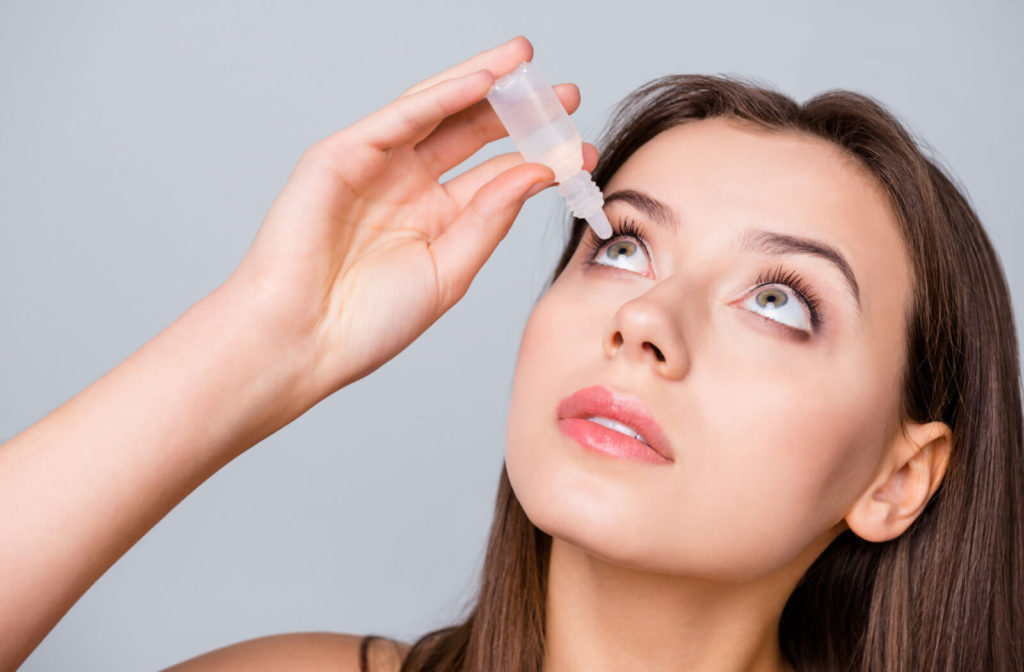When it comes to eye drops, it’s common to have a few bottles lying around—not to mention those you may have stashed in different places—your purse, car, and medicine cabinet.
Just like any other medication, eye drops have a shelf-life, which is usually indicated on the packaging. So, what do you do when you find an expired bottle of eye drops? Can you use it or not?
If your eye drops are expired, it’s best to throw them away. When they’re beyond the manufacturer’s guaranteed freshness date, the active ingredients can lose their effectiveness or introduce bacteria into your eyes. Whether you’re using over-the-counter or prescription drops, discuss your concerns with your optometrist before using a new product in your eyes. If you accidentally apply expired eye drops to your eyes, seek an eye exam to help eliminate irritation at the source.
Most Used Types of Eye Drops
Your eyes are crucial in your life, allowing you to take in the world. It’s essential to take good care of them. Eye drops are an effective and easy way to combat many issues related to your eye health. However, with so many eye drops available, it can be difficult to know which type to choose. Your optometrist can provide guidance on which eye drops are best for your needs.
Artificial tears
Lubricating eye drops, or artificial tears, are the most common type and are widely available without a prescription. They are often used for dry eye symptoms or for eyes that feel gritty and irritated.
Artificial tears mimic the eye’s natural tear production and can provide relief for irritated or dry eyes. They can be used as often as needed and stored at room temperature. However, it’s important to note that some brands may contain preservatives that can irritate some people’s eyes.
Antihistamine Drops
Antihistamine eye drops are the go-to choice for people who suffer from allergies or allergic conjunctivitis. These drops prevent the release of histamine, a chemical that triggers allergy symptoms such as itching, redness, and inflammation.
The effects of antihistamine eye drops can last up to 12 hours, making them a good option for allergy relief. However, it’s important to avoid using these drops for extended periods, as they can cause rebound effects, which are more severe than the original allergy symptoms.
Antibiotic & Steroid Drops
Antibiotic and steroid drops primarily treat bacterial or viral eye infections. Antibiotics help fight off bacteria and prevent infections, while steroids can reduce inflammation. It’s essential to follow the prescription provided by your eye doctor when using these drops and to use them for the entire period prescribed by the doctor to avoid a recurring infection.
Lubricating Ointments
Lubricating ointments are different from artificial tears as they are thicker and more viscous, so they are often used as a nighttime treatment. They tend to blur vision, so it’s best to use them before bed. Lubricating ointments are ideal for people with severe dry eyes or those undergoing LASIK or other eye surgeries.
Eye Drop Expiration: What Does It Mean?
The label’s expiration date represents when the drug manufacturer guarantees the effectiveness and safety of the medication. Unlike with food, with a best-before date, the expiration date of your eye drops should be followed to the letter, whether the bottle is opened or not.
Risks of Using Expired Eye Drops
Using expired eye drops comes with some hazards. One primary risk of expired eye drops is that they may not work as effectively as they should. Eye drops lose their potency over time, and the active ingredients can degrade, meaning they may not provide the intended relief for your condition.
If you’re using expired eye drops to treat a case of eye allergies, you may not get the relief you need. Furthermore, expired eye drops may produce uncomfortable side effects, such as itching, blurred vision, burning, and redness.
Another risk of using expired eye drops is that they may become contaminated with bacteria or fungi, leading to an eye infection. Unopened eye drops have preservatives that help prevent bacterial growth, but these preservatives break down over time. Once opened, eye drops are more susceptible to bacterial infections, and when they expire, the chances of contamination increase significantly. Using contaminated eye drops may lead to serious eye infections that require medical attention.
For over-the-counter eye drops, it’s best to check the expiry date before use. If the bottle has been opened already, or you’re unsure if the drops have gone bad, then it’s best to dispose of them. If you have a recurring eye problem and use eye drops regularly, it may help to mark the bottle’s opening date to know when to dispose of it.
What to Do If You Used Expired Eye Drops
If you accidentally use expired eye drops—don’t panic! Follow these steps to help mitigate any potential risks.
First, rinse your eyes with clean, lukewarm water to help flush out any residue from the expired drops. Monitor your eyes for any signs of adverse reactions such as redness, irritation, swelling, or blurred vision. If you notice any of these symptoms or if you experience persistent discomfort, contact your eye doctor right away.
While the eye drops with preservatives typically prevent bacterial growth, using expired products can still pose a risk of infection or reduced effectiveness. To avoid future mishaps, always check the expiration date before using eye drops and dispose of any outdated products properly.
Maintaining a routine of regularly checking your eye care supplies can help ensure you always have safe, effective products on hand.
Keep Your Eyes Healthy
Your eyes are a vital part of your body, and keeping them healthy is key to your overall well-being. Whether you need eye drops for dry eyes, allergy relief, or to combat an infection, following your optometrist’s directions can help you overcome uncomfortable symptoms effectively.
If you have eye discomfort or vision concerns, book a visit with the qualified optometry team at Seal Beach Eyes for advice on treatment options and eye drops.




